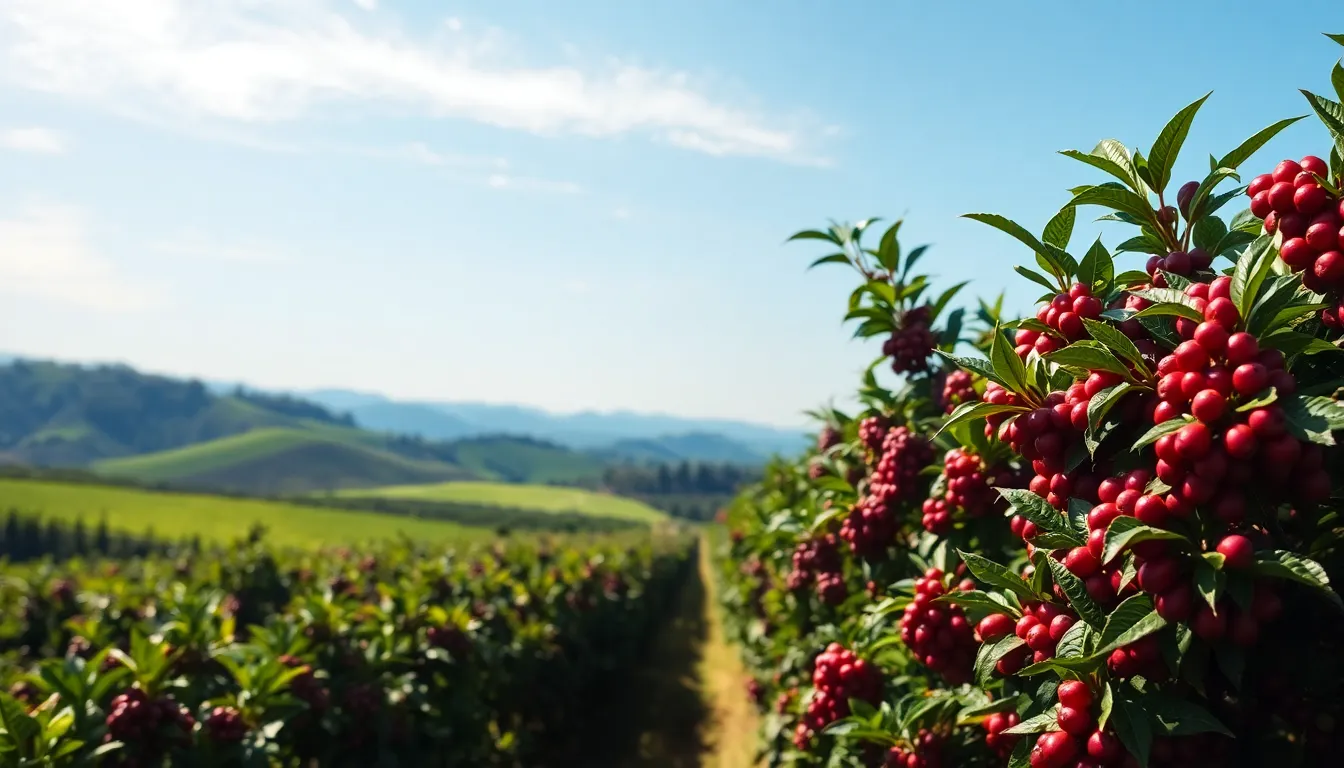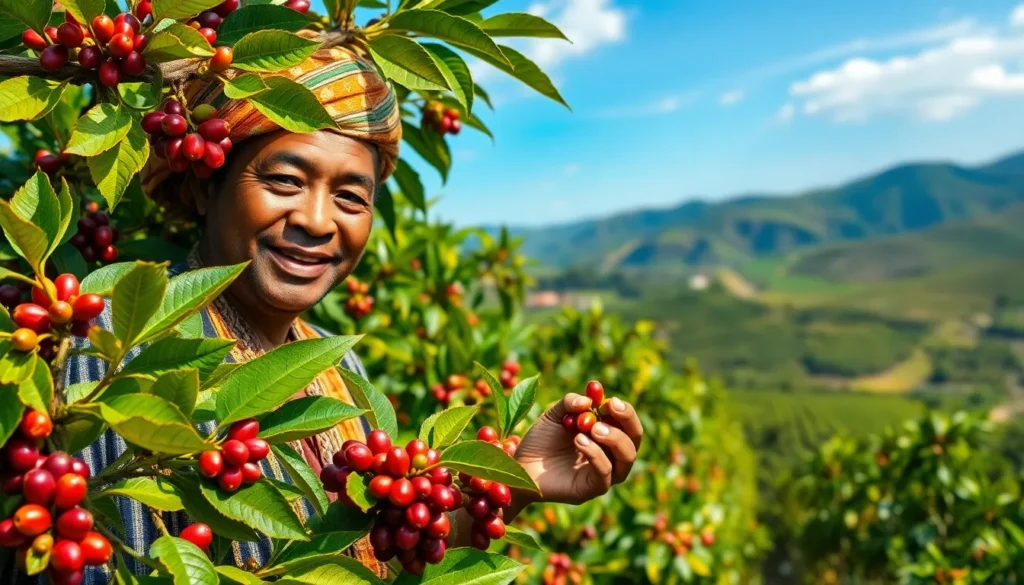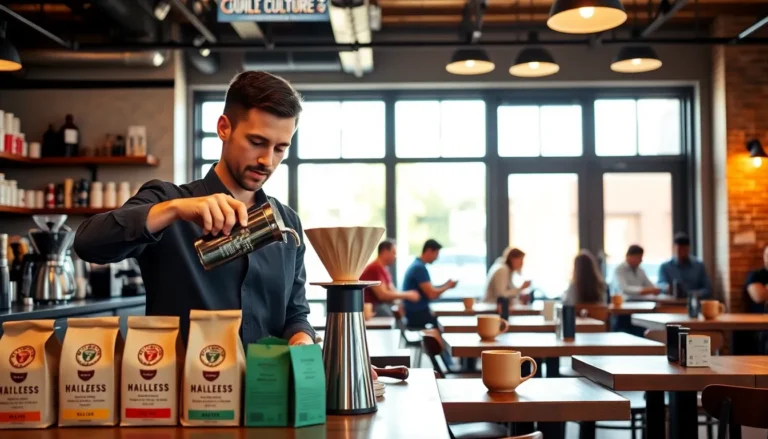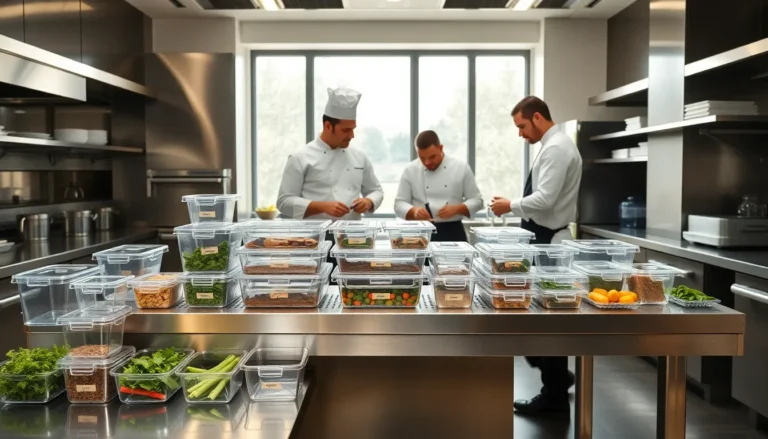Coffee isn’t just a beloved beverage; it’s a rich tapestry woven through history, culture, and tradition. From the lush coffee farms of Ethiopia to the bustling cafes of Paris, each cup tells a story of its origins and the people behind it. Understanding coffee heritage reveals the intricate journey of this cherished drink and its profound impact on societies around the world.
As the global coffee culture continues to evolve, appreciating its heritage becomes essential. This exploration connects coffee lovers to the land, the farmers, and the unique practices that shape the flavors they enjoy. Delving into the traditions and innovations surrounding coffee offers a deeper appreciation for every sip, reminding us that this simple drink carries centuries of history and passion.
Table of Contents
ToggleUnderstanding Coffee Heritage
Coffee heritage encompasses the historical, cultural, and traditional elements associated with coffee production and consumption. This heritage connects individuals to the practices and stories of farmers and regions worldwide.
Definition of Coffee Heritage
Coffee heritage refers to the collective traditions, practices, and cultural narratives surrounding coffee cultivation and preparation. This includes the geographical origin of coffee varieties, the agricultural methods used, and the ritualistic practices of brewing and serving coffee. Each region hosts unique attributes that contribute to the diversity of flavors and experiences associated with coffee.
Importance of Coffee Heritage
Coffee heritage plays a crucial role in promoting sustainability and cultural identity.
- Sustainability: Understanding coffee heritage encourages sustainable farming practices that protect the environment, enhance biodiversity, and preserve local economies.
- Cultural Identity: Coffee traditions reflect the cultural identity of communities, linking them to their history and social customs.
- Flavor Education: Knowledge of regional coffee heritage fosters appreciation for diverse flavor profiles, enriching the consumer’s experience.
- Market Value: Awareness of heritage coffee can impact market trends, directing consumers toward ethically sourced and premium products.
By valuing coffee heritage, individuals contribute to the preservation of cultural practices and promote responsible consumption.
Historical Background

The historical background of coffee reveals its intriguing journey through time and culture, emphasizing the significance of its origins and cultivation practices.
Origins of Coffee
Ethiopia serves as the acknowledged birthplace of coffee. Legend recounts a goat herder named Kaldi who, in the 9th century, discovered coffee after noticing his goats became energetic after consuming coffee cherries. By the 15th century, coffee reached the Arabian Peninsula, where it gained popularity in Yemen. The earliest records of coffee consumption date back to this region, particularly in the Sufi monasteries where it aided in long hours of prayer. By the 16th century, coffee spread to Persia, Egypt, and Turkey, establishing coffee houses, known as qahveh khaneh, as social hubs.
Evolution of Coffee Cultivation
Coffee cultivation evolved significantly over the centuries. The 17th century marked the beginning of coffee plantations outside Arabia, with the Dutch introducing coffee to Java. By the 18th century, French colonists brought coffee to the Caribbean, leading to its spread in the Americas. Brazil emerged as a key player in coffee production, becoming the largest producer by the 19th century. Advances in agricultural techniques, such as selective breeding and sustainable farming practices, contributed to improved yield and quality. Today, coffee farming focuses on preserving biodiversity while addressing challenges posed by climate change and global market demands.
Cultural Significance
Coffee holds a profound cultural significance across the globe, shaping traditions, social interactions, and rituals. Its influence extends beyond mere consumption, linking communities and enhancing cultural identities.
Coffee Traditions Around the World
Coffee traditions vary widely, reflecting distinct cultural narratives. In Ethiopia, coffee ceremonies symbolize hospitality and community, emphasizing the ritualistic preparation and sharing of coffee among guests. Turkish coffee is celebrated for its unique preparation method and is recognized by UNESCO as an Intangible Cultural Heritage. In Sweden, the concept of “fika,” meaning a coffee break with pastries, fosters social connections. In Italy, espresso culture underscores the quick enjoyment of high-quality coffee, while in Brazil, cafézinho serves as a symbol of generosity and connection. Each tradition enhances appreciation for regional flavors and communal experiences.
Role of Coffee in Social Interactions
Coffee plays a central role in social interactions, acting as a catalyst for conversation and connection. In many cultures, cafés function as communal gathering spaces that encourage dialogue and creativity. Coffee’s presence in diverse settings, from business meetings to casual gatherings, underscores its function as a social lubricant. For instance, coffee houses in the Ottoman Empire were centers for intellectual exchange, influencing art and politics. Today, coffee culture continues to thrive, fostering relationships and building communities around shared experiences, whether at a local café or a family gathering.
Preservation of Coffee Heritage
Preserving coffee heritage involves addressing challenges while implementing effective efforts to maintain cultural practices and traditions. The future of coffee depends on how well these elements are safeguarded against modern threats.
Challenges Facing Coffee Heritage
Challenges affecting coffee heritage include climate change, industrialization, and globalization.
- Climate Change: Rising temperatures and unpredictable weather patterns disrupt traditional growing regions, impacting flavor profiles and yield.
- Industrialization: Large-scale monoculture practices threaten biodiversity, reducing the number of heirloom coffee varieties and diminishing unique flavor characteristics.
- Globalization: Major corporations often overshadow local producers, leading to cultural erosion and a focus on profit over tradition.
These factors create significant obstacles in maintaining the diverse cultural narratives tied to coffee.
Efforts to Preserve Coffee Traditions
Efforts to preserve coffee traditions include educational programs, community-driven projects, and certifications.
- Educational Programs: Workshops and courses help educate producers and consumers about the history and significance of coffee, enriching the appreciation of different brewing methods.
- Community-Driven Projects: Local initiatives encourage farmers to adopt sustainable practices that honor traditional methods, enhancing community ties and cultural identity.
- Certifications: Programs like Fair Trade and Rainforest Alliance promote ethical sourcing, ensuring that traditional coffee producers benefit economically while preserving their cultural heritage.
These collaborative actions support the continuation of coffee heritage, promoting its role as a cultural and economic cornerstone in communities worldwide.
The Future of Coffee Heritage
The future of coffee heritage hinges on the ability to adapt to modern challenges while preserving traditional practices. Industry stakeholders face the pressing need to balance cultural significance with evolving market dynamics.
Impact of Globalization
Globalization influences coffee heritage through the integration of diverse practices and flavors. Increased access to global markets fosters collaboration among coffee producers, allowing for the exchange of knowledge and techniques. However, it also poses risks to local traditions and biodiversity. As mass-produced blends gain popularity, the unique profiles of local coffee varieties may diminish, threatening the longevity of distinct heritage practices. Awareness and appreciation for regional coffees encourage consumers to support traditional cultivation methods, reinforcing the importance of preserving local identities amidst globalization.
Sustainability in Coffee Cultivation
Sustainability in coffee cultivation plays a critical role in preserving coffee heritage. It involves implementing practices that enhance environmental health, promote biodiversity, and support local communities. Shift towards organic farming and agroforestry systems helps mitigate the impacts of climate change while retaining traditional agricultural methods. Certification programs, such as Fair Trade and Rainforest Alliance, ensure that farmers receive fair compensation and adhere to sustainable practices. By prioritizing sustainability, the coffee industry enhances the quality of the beverage while safeguarding cultural heritage, securing a viable future for both coffee producers and enthusiasts.
Understanding coffee heritage enriches the experience of enjoying this beloved beverage. It connects individuals to the rich tapestry of history and culture that coffee embodies. By valuing the traditions and practices surrounding coffee, enthusiasts not only deepen their appreciation for its flavors but also contribute to the sustainability of its production.
As the world continues to evolve, preserving coffee heritage becomes increasingly vital. Supporting local farmers and sustainable practices ensures that future generations can enjoy coffee while honoring its origins. The journey of coffee from farm to cup is a testament to the passion and dedication of those who cultivate it, making every sip a celebration of its extraordinary legacy.



